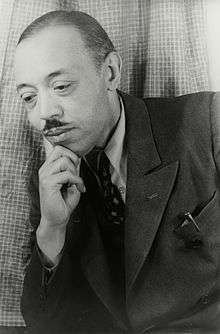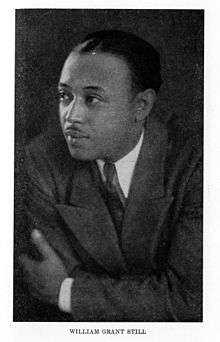William Grant Still
| William Grant Still | |
|---|---|
 Portrait of Still by Carl Van Vechten | |
| Born |
May 11, 1895 Woodville, Mississippi, USA |
| Died |
December 3, 1978 (aged 83) Los Angeles, California, USA |
| Occupation |
|
| Signature | |
|
| |
William Grant Still (May 11, 1895 – December 3, 1978) was an American composer, who composed more than 150 works, including five symphonies and eight operas.
Often referred to as "the Dean" of African-American composers, he was the first African American to conduct a major American symphony orchestra, the first to have a symphony (his 1st Symphony) performed by a leading orchestra, the first to have an opera performed by a major opera company, and the first to have an opera performed on national television.[1] His 1st Symphony was also at one time the most widely performed symphony by an American composer.
Born in Mississippi, he grew up in Little Rock, Arkansas, attended Wilberforce University and Oberlin Conservatory of Music, and was a student of George Whitefield Chadwick and later Edgard Varèse.
Life
William Grant Still was born on May 11, 1895 in Woodville, Mississippi. He was the son of two teachers, Carrie Lena Fambro Still (1872–1927) and William Grant Still Sr.(1871–1895). His father was a partner in a grocery store and performed as a local bandleader. William Grant Still Sr. died when his infant son was three months old.
Still's mother moved with him to Little Rock, Arkansas, where she taught high school English for 33 years. She met and married Charles B. Shepperson, who nurtured his stepson William's musical interests by taking him to operettas and buying Red Seal recordings of classical music, which the boy greatly enjoyed. The two attended a number of performances by musicians on tour. His maternal grandmother sang African-American spirituals to him.
Still grew up in Little Rock, and started violin lessons at the age of 15. He taught himself to play the clarinet, saxophone, oboe, double bass, cello and viola, and showed a great interest in music. At 16 he graduated from M. W. Gibbs High School in Little Rock.
His mother wanted him to go to medical school, so Still pursued a Bachelor of Science degree program at Wilberforce University, a historically black college in Ohio.[2] Still became a member of Kappa Alpha Psi fraternity. He conducted the university band, learned to play various instruments, and started to compose and to do orchestrations.
He was awarded scholarships to study at the Oberlin Conservatory of Music with Friedrick Lehmann and with George Whitefield Chadwick. He also studied with the modern composer Edgard Varèse.
Still was married to pianist Verna Arvey. Their granddaughter is journalist Celeste Headlee.
Career
In 1918, Still joined the United States Navy to serve in World War I. Between 1919 and 1921, he worked as an arranger for W. C. Handy's band. In 1921 he recorded with Fletcher Henderson's Dance Orchestra, and later played in the pit orchestra for Noble Sissle and Eubie Blake's musical, Shuffle Along. Later in the 1920s, Still served as the arranger of Yamekraw, a "Negro Rhapsody" composed by the noted Harlem stride pianist, James P. Johnson. His initial hiring by Paul Whiteman took place in early November 1929.
In the 1930s, Still worked as an arranger of popular music, writing for Willard Robison's Deep River Hour and Paul Whiteman's Old Gold Show, both popular NBC Radio broadcasts. In 1936, Still conducted the Los Angeles Philharmonic Orchestra; he was the first African American to conduct a major American orchestra.
In 1934, Still received his first Guggenheim Fellowship; he started work on the first of his eight operas, Blue Steel. In 1949 his opera Troubled Island, originally completed in 1939, about Jean Jacques Dessalines and Haiti, was performed by the New York City Opera. It was the first opera by an African American to be performed by a major company.
Still moved to Los Angeles in the 1930s, where he arranged music for films. These included Pennies from Heaven (the 1936 film starring Bing Crosby and Madge Evans) and Lost Horizon (the 1937 film starring Ronald Colman, Jane Wyatt and Sam Jaffe). For Lost Horizon, he arranged the music of Dimitri Tiomkin. Still was also hired to arrange the music for the 1943 film Stormy Weather, but left the assignment after a few weeks due to artistic disagreements.
In 1955, he conducted the New Orleans Philharmonic Orchestra; he was the first African American to conduct a major orchestra in the Deep South. Still's works were performed internationally by the Berlin Philharmonic Orchestra, the London Symphony Orchestra, the Tokyo Philharmonic Orchestra, and the BBC Orchestra.
He was the first African American to have an opera performed on national United States television when A Bayou Legend, completed in 1941, premiered on PBS in June 1981. Additionally, he was the recording manager of the Black Swan Phonograph Company.
Legacy and honors
- William Grant Still received two Guggenheim Fellowships.
- He was awarded honorary doctorates from Oberlin College, Wilberforce University, Howard University, Bates College, the University of Arkansas, Pepperdine University, the New England Conservatory of Music, the Peabody Conservatory in Baltimore, and the University of Southern California.
- He was posthumously awarded the 1982 Mississippi Institute of Arts and Letters[3] award for music composition for his opera A Bayou Legend.
Selected compositions

- From the Land of Dreams (1924, believed lost until 1997)
- Darker America (1924)
- Levee Land (1925)
- From the Black Belt (1926)
- La Guiablese, ballet (1927)
- Sahdji, ballet (1930)
- Africa (1930)
- Symphony No. 1 "Afro-American" (1930)
- A Deserted Plantation (1933)
- Blue Steel, opera (1934)
- Symphony in G minor (1937)
- Lenox Avenue, for radio announcer, chorus, & orchestra (1937)
- Seven Traceries (1939)
- And They Lynched him on a Tree (1940)
- Miss Sally's Party, ballet (1940)
- Can'tcha line 'em, for orchestra (1940)
- Old California, for orchestra (1941)
- Troubled Island, opera, produced 1949 (1937–39)
- A Bayou Legend, opera (1941)
- A Southern Interlude, opera (1942)
- Incantation and Dance, for oboe & pf.
- In Memoriam: The Colored Soldiers Who Died for Democracy (1943)
- Suite for Violin & Piano, including the movement later arranged for String Orchestra as Mother and Child (1943)
- Festive Overture (1944)
- Poem for Orchestra (1944)
- Symphony No. 5, "Western Hemisphere" (1945)
- Wailing Women, for soprano and chorus (1946)
- Symphony No. 4, "Autochthonous" (1947)
- Grief, originally titled by Still as Weeping Angel (1953)
- Danzas de Panama (Dances of Panama) (1953)
- The Little Song That Wanted to Be a Symphony (1954)
- Little Red Schoolhouse (1957)
- The American Scene (1957)
- Ennanga (1958)
- Lyric Quartet (1960)
- Highway 1 U.S.A., opera (1963)
See also
- Samuel Coleridge-Taylor, an earlier Black British composer whom Still greatly admired
- List of African American firsts
- Black conductors
- List of African American Composers
Further reading
- Janower, David, "The Choral Works of William Grant Still", in The Choral Journal, May 1995.
- Reef, Catherine (2003). William Grant Still: African American Composer. Morgan Reynolds. ISBN 1-931798-11-7
- Sewell, George A., and Margaret L. Dwight (1984). William Grant Still: America's Greatest Black Composer. Jackson: University Press of Mississippi
- Smith, Catherine Parsons (2000). William Grant Still: A Study in Contradictions. University of California Press. ISBN 0-520-21543-5
- Soll, Beverly (2005). I Dream A World: The Operas of William Grant Still. Fayetteville: University of Arkansas Press. ISBN 1-55728-789-9
- Southern, Eileen (1984). William Grant Still – Trailblazer. Fayetteville: University of Arkansas Press.
- Still, Verna Arvey (1984). In One Lifetime. Fayetteville: University of Arkansas Press.
- Still, Judith Anne, Michael J. Dabrishus, and Carolyn L. Quin (1996). William Grant Still: A Bio-Bibliography. Greenwood Press.
References
- ↑ Kirk, Elise Kuhl (2001). American Opera, pp. 200–204. University of Illinois Press. ISBN 0252026233
- ↑ "William Grant Still", Encyclopædia Britannica.
- ↑ "Mississippi Institute of Arts and Letter Winners". ms-arts-letters.org. Retrieved 7 January 2016.
- Horne, Aaron. Woodwind Music of Black Composers, Greenwood Press, 1990.
- Roach, Hildred. Black American Music. Past and Present, second edition, Krieger Publishing Company 1992.
- Sadie, Stanley; Hitchcock, H. Wiley. The New Grove Dictionary of American Music, Grove's Dictionaries of Music, 1986.
External links
- William Grant Still Music, site with comprehensive information about him and his music
- Interview, Transcript, African American Music Collection, University of Michigan
- "William Grant Still; Composer, Arranger, Conductor & Oboist". Extensive info at AfriClassical.com
- Learning to Listen, public radio program featuring Still's music and a conversation with his granddaughter Celeste Headlee.